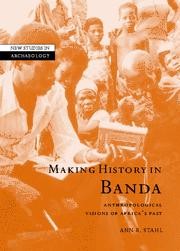Book contents
- Frontmatter
- Contents
- List of figures
- List of plates
- List of tables
- Preface
- 1 Refracted visions of Africa's past
- 2 Envisioning Africa's lived past
- 3 The past in the present: history-making in Banda
- 4 The political-economic context
- 5 Local life in the context of the Niger trade c. 1300–1700
- 6 The changing social fields of Banda villagers c. 1725–1825
- 7 The changing social fields of Banda villagers c. 1825–1925
- 8 Reflections: historical anthropology and the construction of Africa's past
- Notes
- References
- Index
- Other books published in the series
1 - Refracted visions of Africa's past
Published online by Cambridge University Press: 22 September 2009
- Frontmatter
- Contents
- List of figures
- List of plates
- List of tables
- Preface
- 1 Refracted visions of Africa's past
- 2 Envisioning Africa's lived past
- 3 The past in the present: history-making in Banda
- 4 The political-economic context
- 5 Local life in the context of the Niger trade c. 1300–1700
- 6 The changing social fields of Banda villagers c. 1725–1825
- 7 The changing social fields of Banda villagers c. 1825–1925
- 8 Reflections: historical anthropology and the construction of Africa's past
- Notes
- References
- Index
- Other books published in the series
Summary
The study of Africa's past has been divided, pie-like, between disciplines with separate yet overlapping histories: history, archaeology, and, more recently, anthropology. These divisions mirror disciplinary boundaries that emerged at the end of the nineteenth century as the academy took its modern form. During the present century, these divisions at times blurred, yet each discipline carries with it the freight of its own history (Wolf 1994:1), the assumptions and methods that shape inquiry, the prism through which disciplinary perspectives are refracted. In this chapter, I examine the historic turn in anthropology (cf. McDonald 1996) and its relationship with African history, examining the promise of a robust multidisciplinary understanding of Africa's past. Few studies have delivered on that promise, and I examine how now-rejected paradigms continue to inhibit meaningful integration of historical, anthropological, and archaeological insights into Africa's past. More specifically, I examine a series of epistemological legacies that shape methods of historical reasoning, including progressive evolutionism, the direct historic approach, structural functionalism, and tribal models. I argue that these legacies actively create and maintain a series of silences about Africa's past, silences that are perpetuated by contemporary academic practice.
Silences in the production of history
The textbook history of our youth was a history of states and statesmen, of men primarily, and Europeans predominantly, with a firm focus on events of evident significance. It was a history peopled by few, absent of many.
- Type
- Chapter
- Information
- Making History in BandaAnthropological Visions of Africa's Past, pp. 1 - 18Publisher: Cambridge University PressPrint publication year: 2001

